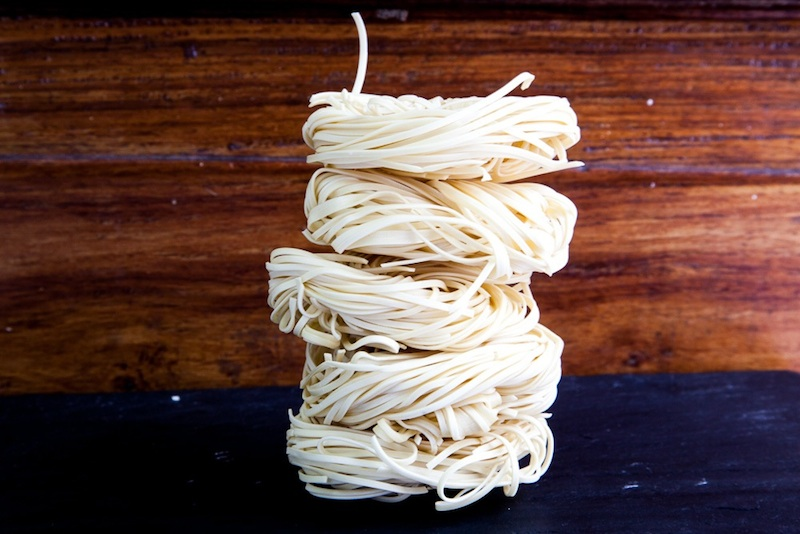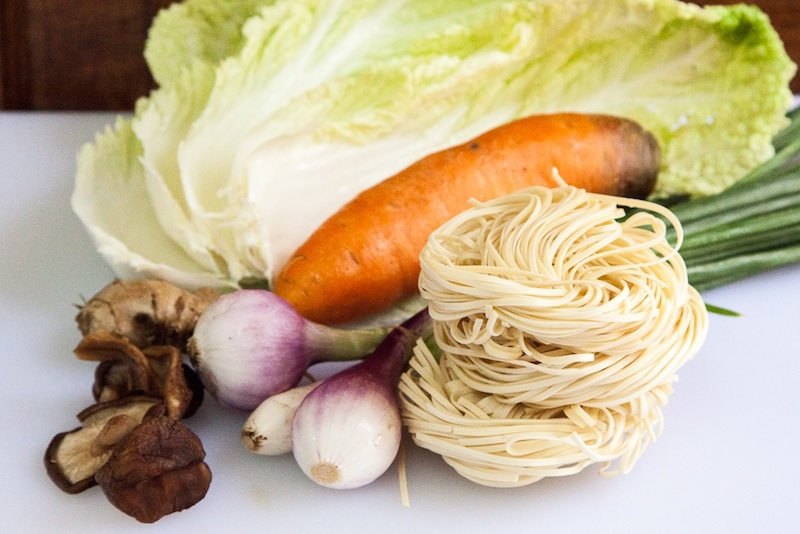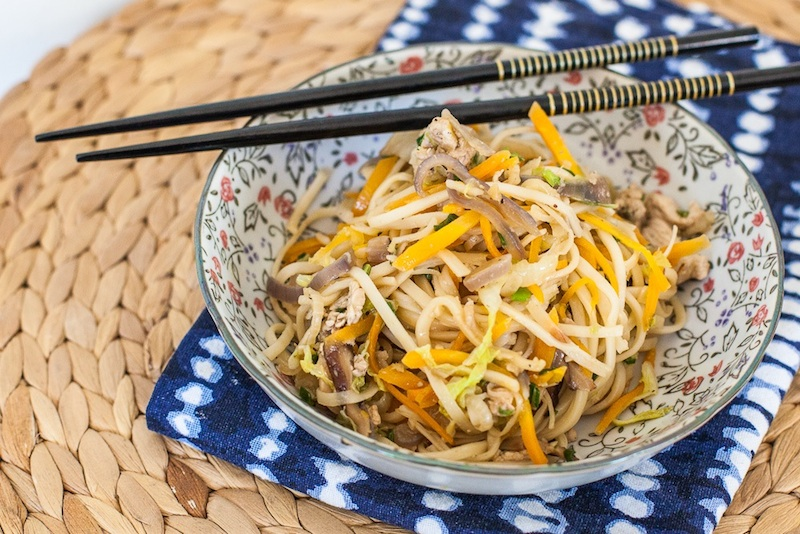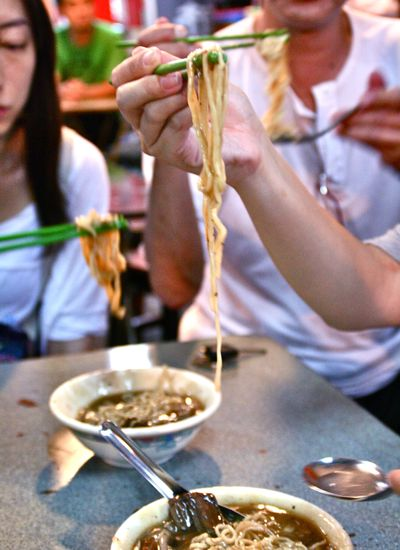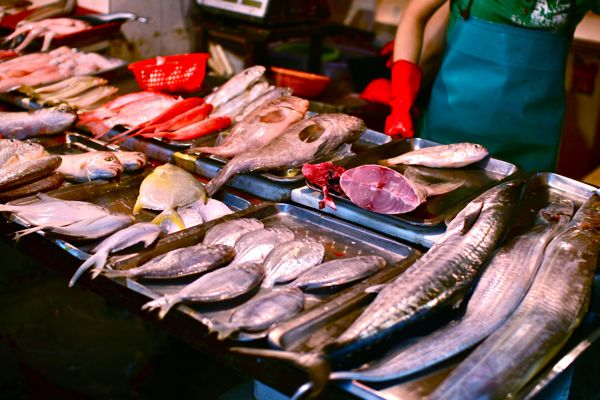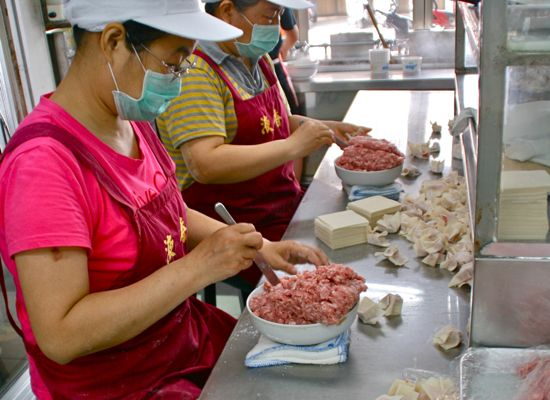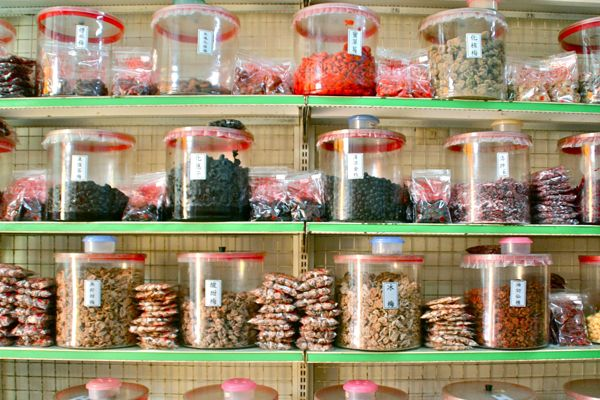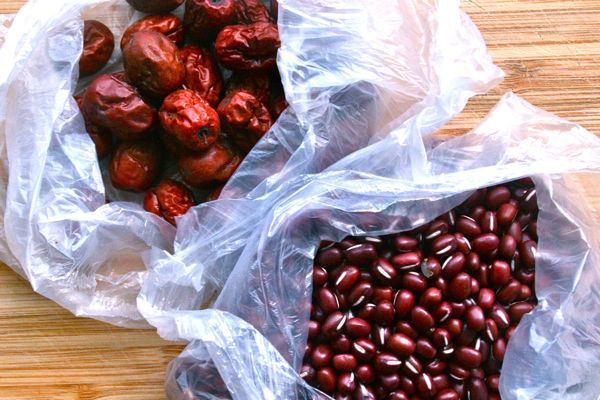Happy Chinese New Year. There’s my grandmother on my father’s side along with my grandfather, looking pretty awesome. Tiny people!
Though I’m mostly Chinese and grew up with Chinese customs mixed into our American life, my family, strangely, didn’t really celebrate Chinese New Year in any huge fashion.
I went to Chinese school once a week every week, so during that one day of the year we would get little red envelopes with a $2 bill folded crisply in half, but that was about it for me and my sister. Other kids in my Chinese School class would boast how much money they received at home; even at the tender age of 9, I knew that $100 was an exorbitant amount for a second grader.
In lieu of cash, and I suppose without any regrets from any of us in retropect, the only consistent tradition observed by my family every year was an emphasis on food; a meal together on at least one night surrounding the New Year holiday. Even though this emphasis would always seem to come about more casually that naught, with either mom or dad saying something like, oh shoot, it’s Chinese New Year tomorrow, we should definitely have fish for dinner.
If not fish than it was noodles, sometimes dumplings or 10-ingredient stir fry and 8-jewel-sticky rice or nien gao for dessert. Throughout dinner we would be asked the same question, as we were asked every year: do you know why we’re eating (insert so-and-so) now?
Though we rolled our eyes at the time, we were also nervously excited to carefully, with the calculated concentration so practiced by children, give the right answer. After all, if it’s anything that the Chinese are, it’s superstitious, and everything has a meaning attached. Peaches for fertility, dumplings for wealth, oranges for luck, cakes for prosperity, the list goes on.
The two big-occasion dishes of our household during all Chinese gatherings were fish, and noodles.
Fish was a favorite of mine, for its multiple symbolic qualities, some of which I could remember, some I could not. Always whole, usually steamed, with its beady, glazed eyes always seemingly pointing at me. On the table only because it of an eponymous misfortune (for the fish, at least); the word “fish” in Chinese is a homonym with the word for prosperity, and so, eating fish over the new year is extremely good luck (for the diner).
In traditional fishing cultures, as was the tiny island of Taiwan where my parents are from, it brings especially great luck in the year ahead. However one should NEVER flip a fish over on the serving platter, for this indicates a sunken boat and bad luck at sea. Rather, the spine should be lifted off the plate once the meat is picked cleanly from the bones.
My sister preferred noodles, because she was a normal child and liked noodles over fish. I remember we were told, year in and year out, that noodles signified longevity, and more so than usual, we slurped as if the louder our inhalation of an entire noodle, the longer we’d live.
I’m surprised as to how much of this knowledge I’m able to recall all these years later, without hesitation and with great pride. Food serves many important roles, most fundamentally in its nourishing qualities, but to me, it’s also a reminder of where I’m from, and the family that I’m tied to.
It’s Chinese New Year today, and to celebrate, these noodles will likely make an appearance…well, sometime this weekend.
Chow Mein, aka Longevity Noodles
Ingredients:
- 1 small knob Ginger, about 10g or 2 tsp. peeled and grated
- 2 cloves Garlic, minced
- 2 Tbsp. Soy sauce
- 1 Tbsp. Sesame oil
- 3 spring onions, thinly sliced, whites and greens separated
- 1 chicken breast, approx. 200g
- 4 servings egg noodles (see your package’s directions) + sesame oil
- 1 small red onion
- 6 leaves (approx. 275g) Chinese napa or savoy cabbage, thinly sliced
- 8 shiitake or oyster mushrooms, thinly sliced
- 2 carrots, julienned
Directions:
- Cut chicken into thin strips. In a medium bowl, combine chicken with ginger and garlic, the whites of the green onion (reserve the green to add into noodles later), soy sauce, and sesame oil. Cover. Marinate for at least 15 minutes, or 1-2 hours if possible for more flavor.
- After chicken has marinated to your liking, cook noodles according to package directions. Drain, and drizzle additional sesame oil and toss. This will not only add a great flavor and fragrance to your dish, but it will also keep the noodles from congealing and sticking together!
- In a wok or large saute pan over high heat, add 2 Tbsp. Cooking oil (peanut or grapeseed are the best for Chinese cookery). When oil is hot, add onion. Saute for two minutes, or until onion starts to become translucent. Add napa cabbage and mushrooms, cooking for another 3 minutes. Add the marinated chicken, stirring constantly. When chicken is no longer pink (just about 30-40 seconds), add carrots and green onion. Continue to saute until chicken is cooked through, about 3-4 minutes, occasionally tossing with a wooden spoon.
- Add noodles to the pan, carefully turning noodles into the vegetables with the help of tongs or chopsticks. Cook for another minute or two. Taste, adding another Tbsp. of soy sauce if you would like more flavor. Transfer to a large dish or bowl, and serve immediately.
Optional: substitute shrimp, peeled and de-veined, instead of chicken. Or, broccoli, for a vegetarian option!


